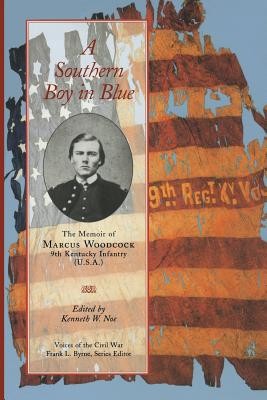
- We will send in 10–14 business days.
- Author: Kenneth W Noe
- Publisher: Univ Tennessee Press
- ISBN-10: 1572331267
- ISBN-13: 9781572331266
- Format: 15.2 x 22.8 x 2.8 cm, minkšti viršeliai
- Language: English
- SAVE -10% with code: EXTRA
Reviews
Description
Of the one hundred thousand Southerners who donned Federal uniforms during the Civil War, more than forty thousand were Tennesseeans. Not surprisingly, most came from the Appalachian counties of East Tennessee--but not all. A Middle Tennessean named Marcus Woodcock, not yet nineteen when the war began, was among the exceptions.
A Southern Boy in Blue is Woodcock's own account of his experiences during the war. After joining the 9th Kentucky Infantry, Woodcock barely missed the battle of Shiloh--a bout of measles kept him from the front lines--but he went on to see action at Stones River, Chickamauga, and Missionary Ridge. He also participated in the Atlanta campaign and the siege of Corinth and was among the reserves at the battle of Perryville. In three years he rose from the rank of private to that of first lieutenant. Since Woodcock wrote his memoir in 1865 (instead of much later as many veterans did), his descriptions of battles, camp life, and period politics have a special vividness. Woodcock's account is also significant in showing how his views and opinions of the war changed over time. Initially opposed to the use of black troops and to Lincoln's re-election, he eventually converted to both positions and describes the process by which he transformed his thinking. Woodcock's memoir has been meticulously annotated by Kenneth Noe, who also provides an introduction that places Woodcock's experiences in historical context and describes his postwar career as a prominent Tennessee legislator, attorney, business administrator, and Baptist layman. The book is not only a compelling personal account but an important addition to the literature on Southern Unionism. The Editor: Kenneth W. Noe is associate professor of history at West Georgia College. He is the author of Southwest Virginia's Railroad: Modernization and the Sectional Crisis.EXTRA 10 % discount with code: EXTRA
The promotion ends in 21d.05:42:02
The discount code is valid when purchasing from 10 €. Discounts do not stack.
- Author: Kenneth W Noe
- Publisher: Univ Tennessee Press
- ISBN-10: 1572331267
- ISBN-13: 9781572331266
- Format: 15.2 x 22.8 x 2.8 cm, minkšti viršeliai
- Language: English English
Of the one hundred thousand Southerners who donned Federal uniforms during the Civil War, more than forty thousand were Tennesseeans. Not surprisingly, most came from the Appalachian counties of East Tennessee--but not all. A Middle Tennessean named Marcus Woodcock, not yet nineteen when the war began, was among the exceptions.
A Southern Boy in Blue is Woodcock's own account of his experiences during the war. After joining the 9th Kentucky Infantry, Woodcock barely missed the battle of Shiloh--a bout of measles kept him from the front lines--but he went on to see action at Stones River, Chickamauga, and Missionary Ridge. He also participated in the Atlanta campaign and the siege of Corinth and was among the reserves at the battle of Perryville. In three years he rose from the rank of private to that of first lieutenant. Since Woodcock wrote his memoir in 1865 (instead of much later as many veterans did), his descriptions of battles, camp life, and period politics have a special vividness. Woodcock's account is also significant in showing how his views and opinions of the war changed over time. Initially opposed to the use of black troops and to Lincoln's re-election, he eventually converted to both positions and describes the process by which he transformed his thinking. Woodcock's memoir has been meticulously annotated by Kenneth Noe, who also provides an introduction that places Woodcock's experiences in historical context and describes his postwar career as a prominent Tennessee legislator, attorney, business administrator, and Baptist layman. The book is not only a compelling personal account but an important addition to the literature on Southern Unionism. The Editor: Kenneth W. Noe is associate professor of history at West Georgia College. He is the author of Southwest Virginia's Railroad: Modernization and the Sectional Crisis.

Reviews